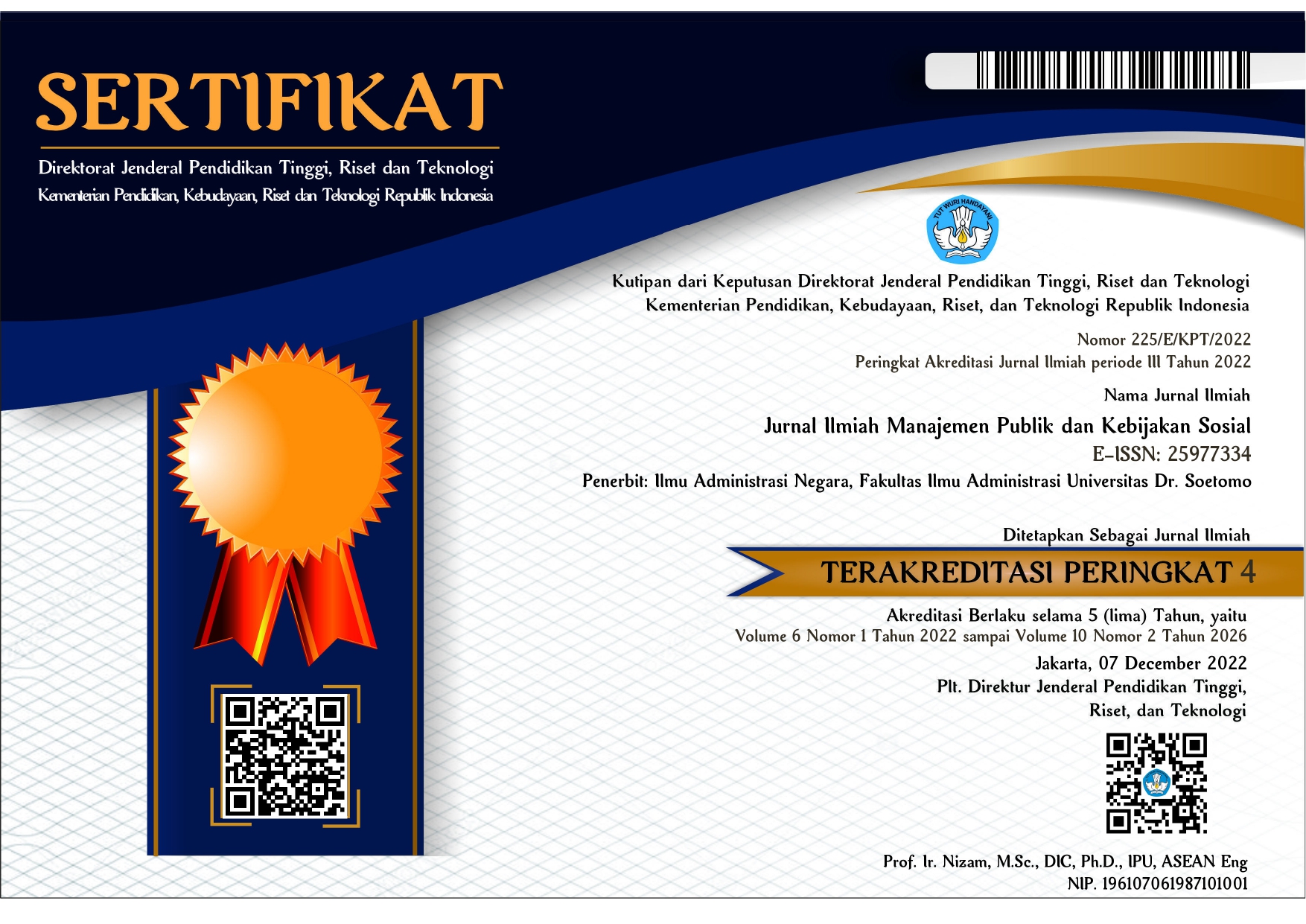Model MSN Approach dalam Implementasi Kebijakan Pengelolaan Sampah
 Abstract views: 490
,
Abstract views: 490
,
 PDF (Bahasa Indonesia) downloads: 422
PDF (Bahasa Indonesia) downloads: 422
Abstract
This study aims to analyze, describe and interpret the implementation of waste management in Nganjuk Regency with a focus on the perspectives of Mentality-Approach, Systems-Approach, and Networking-Approach. Data collection uses four main instruments including observation, interviews, FGD, and documentation. Data analysis uses an interactive data analysis model developed by Miles, Huberman, and Saldana. The results showed that in the mentality approach aspect aspects of behavior, attitudes and responsibilities of the government apparatus (DLH, District and Kelurahan Government) regarding waste management in the Nganjuk sub-district have led to a caring attitude about the importance of keeping the environment clean, responsible behavior by overseeing and educating the public regarding waste management using the 3R method (reduce, recycle, re-use). Meanwhile, from the side of the residents, various facts were found related to the enactment of this regional regulation on waste management. Whereas the system approach aspect shows the fact that the implementation of the Waste Management policy in Nganjuk District is quite clear in the regulatory aspect referring to the Nganjuk PERDA number 01 of 2015. Meanwhile the networking approach aspect shows the fact that strategic partnerships in the implementation of the waste management policy are seen in the meeting point of interests between the district government through DLH, the sub-district government through the existing sub-districts and the community through the existence of waste banks scattered throughout the villages in the Nganjuk sub-district. Although it has not shown maximum mutualism synergy and symbiosis.
References
Cahyadi, A., Siati, & Fatih, A. Al. (2018). Implementasi Kebijakan Pengelolaan Sampah Melalui Bank Sampah Di Kabupaten Purbalingga. Demograpfy Journal of Sriwijaya, 2(2), 25–35.
Dinas Lingkungan Hidup Kabupaten Tegal. (2020). Laporan Kinerja Instansi Pemerintah Dinas Lingkungan Hidup Kabupaten Tegal. 1–9.
Kadji, Y. (2015). Formulasi dan Implementasi Kebijakan Publik Kepemimpinan dan Perilaku Birokrasi dalam Fakta Realitas. In UNG Press Gorontalo.
Liando, M. A. S. D., & Sampe, S. (2017). Implementasi Kebijakan Pengelolaan Sampah Dan Retribusi Pelayanan Kebershan Di Kota Manado. Journal of Chemical Information and Modeling, 53(9), 1689–1699.
Matthew B. Miles, A. Michael Huberman, J. S. (2014). Qualitative Data Analysis. https://books.google.co.id/books?id=p0wXBAAAQBAJ&printsec=frontcover&hl=id&source=gbs_atb#v=onepage&q&f=false.
Mokodompis, Y., Kaunang, M., & Kasenda, V. (2019). Implementasi Kebijakan Pengelolaan Sampah Di Kota Manado. Jurnal Jurusan Ilmu Pemerintahan, 3(3), 1–12.
Sari, P., Santoso, R. S., & Hanani, R. (2022). Determinan Implementasi Kebijakan Pengelolaan Sampah Di Kabupaten Kudus. Journal of Public Policy and Management Review, 11(2), 13–24.
UMSU, A. (2019). No Title(Mimpi) Medan Bebas Banjir, Macet, dan Sampah. 06 Mei 2019. https://analisadaily.com/ berita/arsip/2019/5/7/733081/mimpi-medan-bebas-banjir-macet-dan-samp ah/.
Wachid, A., & Laksamana Caesar, D. (2020). Implementasi Kebijakan Pengelolaan Sampah Di Kabupaten Kudus Policy Implementation of Waste Management in Kudus Regency. Jurnal Kesehatan Masyarakat, 6(2), 173–183.
Zahara, A., Nirzalin, N., & Bin Abubakar, M. (2021). Implementasi Kebijakan Qanun Kota Lhokseumawe Nomor 9 Tahun 2015 Tentang Pengelolaan Sampah Oleh Dinas Lingkungan Hidup Kota Lhokseumawe. Jurnal Transparansi Publik (JTP), 1(1), 1. https://doi.org/10.29103/jtp.v1i1.57.
Copyright (c) 2023 M. Daimul Abror, Rasyadan Taufiq Probojati

This work is licensed under a Creative Commons Attribution-ShareAlike 4.0 International License.
Authors who publish with JIMPKS: Jurnal Ilmiah Manajemen Publik dan Kebijakan Sosial agree to the following terms:
-
Authors retain copyright and grant the journal right of first publication with the work simultaneously licensed under a Creative Commons Attribution License (CC BY-SA 4.0) that allows others to share the work with an acknowledgment of the work's authorship and initial publication in this journal.
-
Authors are able to enter into separate, additional contractual arrangements for the non-exclusive distribution of the journal's published version of the work (e.g., post it to an institutional repository or publish it in a book), with an acknowledgment of its initial publication in this journal.
-
Authors are permitted and encouraged to post their work online (e.g., in institutional repositories or on their website) prior to and during the submission process, as it can lead to productive exchanges, as well as earlier and greater citation of published work.









